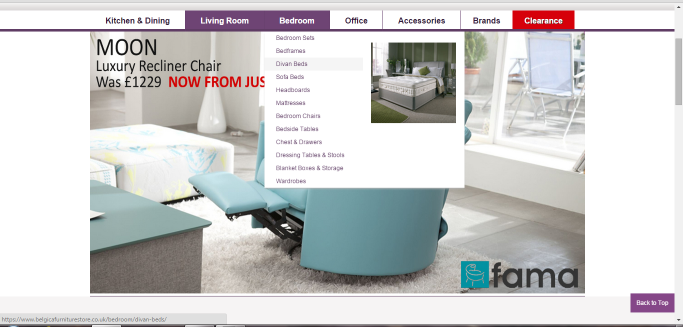Magento: colourful and clever |
|
by David Dwyer on 07/08/2015 |
|
Magento has nothing to do with a shade of dark pink, still less with magi: it’s an e-commerce content management system. Since June 2011 it’s been owned by eBay, which means it’s a very good, safe e-commerce system, designed for real businesses and their customers. There are two versions of Magento. The Community Edition is free, with technical support via forums; anyone can install it – and even contribute to its development – provided they have the skills, but there’s no back-up if you get it wrong. The Enterprise Edition is a very expensive paid-for, fully supported version with more features and functionality than the basic one, including some very powerful customer relationship, promotion and pricing tools. One of the advantages of Magento is that you can set up a storefront for each of several businesses and domain names, and access all of them from the same admin panel, avoiding a lot of hassle if you use different websites for different products. Using Magento you can also have different pricing structures on the same website for different customers; group your products by colour, type or style; have targeted promotions for favoured customers; create coupons for selected market segments; and help buyers find exactly what they want via layered navigation. Inspire used Magento to create a new website for Belgica Furniture (https://www.belgicafurniturestore.co.uk/), a furniture, accessories and interior design company. There are two ways customers can find the products they want. They can browse by style - the “Bedroom” drop-down menu, for example, has subheadings for Bedframes, Divan Beds, Headboards, Mattresses, Chairs, Chests and other ranges; alternatively, they can browse for products by a specific manufacturer, such as Calligaris. That means that, on a site with thousands of products, customers don’t have to trawl through the entire range to find the items they want, so they have a good experience of the business. You'll notice that the drop down menu also has an image for each category of an actual product stocked to re-inforce the sales message.
Items can be saved in a wish-list or ordered and paid for online. Customers can also create their own online accounts, giving them faster checkout and the ability to save multiple delivery addresses and keep track of orders. Subscribers also receive personalised offers and special deals by email. Magento makes all this – and more – possible. The Magento community has a significant number of module plug-ins (some free but most paid for) that will deliver specific functionality you may still need to edit the code to make it work the way you really want it too. In some cases you just need to develop your own solution if that plug-in module doesn't exist. For example we customised a site search plugin that supports corrective search which helps users who are perhaps not quite sure of the spelling for a product. As you can see the actual returns don't just include the product name but also a thumbnail image and a price (including if the price is discounted or not).
In some cases we completely reverse engineered a module and added our own approach as we discovered that it wasn't fit for how we really wanted it to work for users. Have a look at the Product Configurator which is, we believe (Ed: of course we would) a great feature of the website and a means for users to customise their product in a means that is easy to use (Ed: not easy to code, but the end result is something we're really please with). The other search approach is through a product category filter, with many thousands of products available from Belgica's store we believed it crucial to have a very good speed of product filter return, hence we adopted Apache Solr which takes a cached version of the product database and returns the products very quickly indeed as the need to call that database, search the database then load the returns is vastly reduced. This approach is quite common with very large websites, e.g. Arnold Clark have tens of thousands of cars available through their website and also use Apache Solr to support this quick return. Magento offers a range of solutions aimed specifically at the fashion and B2B markets, but many other sectors can use them to advantage as they are all customer-, distribution- and marketing-related. Alongside them, Magento can integrate with most common ERPs (Enterprise Resource Planning applications) so you can collect, store, manage and interpret data about delivery, sales, costs, planning, manufacture, marketing and so on. You can track your inventory over multiple sites, if necessary, and produce and test your landing pages and content marketing. Our client had a specific requirement for his solution to use the Magento platform. As Magento uses the LAMP configuration and we are essentially great PHP and MySQL developers this wasn't an issue for us. That said we often use our own platform to deliver e-commerce sites but we are well aware that our clients have various needs, not least of which is in-house experience in working with a particular platform. Some downsides with Magento. Version updates are crucial and must be applied the consequences though are that the Core Module and any customised changes to the coding MUST BE protected. However the version updates are there for a very good reason and we need to ensure that any coding changes we apply: a) are still functioning post the version update b) are most importantly continue to be secure In other words, if you want us to create a flexible, effective e-commerce site for you we can handle your requirements whether that be using Magento or our own Inspire e-commerce platform. Please remember we don’t use templates for any of our sites – we design all our sites from scratch and tailor them individually for each client – where necessary we do use good software from safe, reputable providers, importantly though we have the inhouse capability to improve on it if needs be.
David Dwyer is Managing Director of Inspire Web Development. He has years of experience in a range of web and IT roles plus seven years in sales and marketing in a blue-chip FMCG company. David’s academic and professional qualifications include a BA (Hons) in Business Economics (Personnel & Ergonomics) from the University of Paisley, an MSc in Information Technology (Systems) from Heriot-Watt University and PRINCE2 Practitioner-level certification. He is also an active member of the British Computer Society, Entrepreneurial Exchange and Business for Scotland.
Follow Inspire on Twitter @inspireltd and @developersos |
|
e-commerce, E-commerce logistics, Inspire Web Development, Inspire Web Services, m-commerce, Magento Community Edition (CE), Magento e-commerce, Magento Enterprise Edition (EE), UI, User Interface, Web Design, Website Support
|
|
|






















